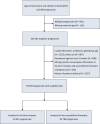Association between maternal alcohol consumption during pregnancy and risk of preterm delivery: the Japan Environment and Children's Study
- PMID: 31386246
- PMCID: PMC7003893
- DOI: 10.1111/1471-0528.15899
Association between maternal alcohol consumption during pregnancy and risk of preterm delivery: the Japan Environment and Children's Study
Abstract
Objective: To examine the association between maternal alcohol consumption during pregnancy and the risk of preterm delivery.
Design: Prospective cohort study.
Setting: The Japan Environment and Children's Study (JECS).
Population: A total of 94 349 singleton pregnancies.
Methods: Participants completed questionnaires detailing alcohol consumption during the first trimester and during the second and third trimesters. Participants were divided into four categories according to alcohol consumption (non-drinkers, consumers of 1-149 g, 150-299 g and ≥300 g ethanol/week). We examined the effect of alcohol consumption during different stages of pregnancy on the risk of preterm delivery. Odds ratios (OR) and 95% CI were calculated relative to non-drinkers using logistic regression.
Main outcome measures: Medical record-based preterm delivery.
Results: Alcohol consumption during the second and third trimesters, but not during the first trimester, was associated with increased risk of preterm delivery. Heavy alcohol consumption (≥300 g ethanol/week) during the second and third trimesters was associated with a four-fold higher risk compared with non-drinkers (multivariable OR 4.52; 95% CI 1.68-12.2). Light alcohol consumption (1-149 g ethanol/week) tended to be associated with lower risk of preterm delivery (multivariable OR 0.78; 95% CI 0.60-1.00).
Conclusions: Heavy alcohol consumption during the second and third trimesters was associated with increased risk of preterm delivery among pregnant women.
Tweetable abstract: Heavy drinking during pregnancy may increase the risk of preterm delivery.
Keywords: Alcohol consumption; pregnant women; preterm delivery; prospective study; the Japan Environment and Children's Study (JECS).
© 2019 Royal College of Obstetricians and Gynaecologists.
Comment in
-
Alcohol in pregnancy: not recommended at any gestational age.BJOG. 2019 Nov;126(12):1455. doi: 10.1111/1471-0528.15918. Epub 2019 Sep 17. BJOG. 2019. PMID: 31454456 Free PMC article. No abstract available.
-
Re: Association between maternal alcohol consumption during pregnancy and risk of preterm delivery: the Japan Environment and Children's Study: Avoiding alcohol and pregnancy: the earlier the better.BJOG. 2020 Feb;127(3):426-427. doi: 10.1111/1471-0528.16003. Epub 2019 Nov 19. BJOG. 2020. PMID: 31746137 No abstract available.
References
-
- Albertsen K, Andersen AM, Olsen J, Grønbaek M. Alcohol consumption during pregnancy and the risk of preterm delivery. Am J Epidemiol 2004;159:155–61. - PubMed
-
- Kesmodel U, Olsen SF, Secher NJ. Does alcohol increase the risk of preterm delivery? Epidemiology 2000;11:512–8. - PubMed
-
- Shiono PH, Klebanoff MA, Rhoads GG. Smoking and drinking during pregnancy. Their effects on preterm birth. JAMA 1986;255:82–4. - PubMed
-
- Lazzaroni F, Bonassi S, Magnani M, Calvi A, Repetto E, Serra F, et al. Moderate maternal drinking and outcome of pregnancy. Eur J Epidemiol 1993;9:599–606. - PubMed
MeSH terms
Grants and funding
LinkOut - more resources
Full Text Sources
Medical


